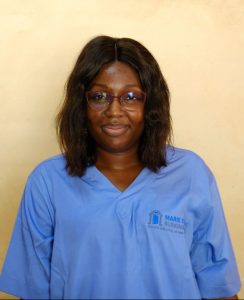She decides: Empowering women’s reproductive choices in Burkina Faso

Alima Kollo, MS Lady
“It’s the smiles I get from the women I help, that’s what keeps me going.”
Thanks to the generosity of its donors, Myriad Canada is partnering with MSI to help finance the MS Ladies who are meeting the pressing need for reproductive health services among women and girls in one of the world’s poorest nations.
“Our providers are very courageous women and men who are conscious that we are giving necessary health services to the women in need in Burkina Faso,” says MSI Country Director Sylvain Ricard.
Giving women the tools to decide
Burkina Faso ranks 182 out of 189 countries on the UN’s 2019 Human Development Index. The country has a great unmet need for reproductive health services, with five women dying each day from pregnancy related complications. Rural families have traditionally been very large, and women carry virtually all the responsibility for child rearing. Adolescent girls are often forced into early marriage, with unwed mothers at risk of being rejected from the home and becoming vulnerable to prostitution.
Choosing whether and when to have children allows women to decide what is best for their family and their health, ultimately helping to reduce Burkina Faso’s high maternal and infant mortality rate. Preventing pregnancy among adolescent girls allows them to continue their education and break the cycle of poverty. To provide reproductive services to poor and hard-to-reach populations in Burkina Faso, MSI deploys 34 MS Ladies, mobile midwives who travel to underserved areas to provide a wide range of contraceptive choices as well as family planning counselling and STI prevention and treatment. Their work is supported by Burkina Faso’s Ministry of Health, which provides them access to public health clinic facilities.
A day in the field
Alima Kollo previously headed a public maternity ward and has been working as an MS Lady for the past six years. “I chose this job as MS Lady because it gave me a lot more opportunities to help women of childbearing age,” she says. Kollo travels up to 50 kilometres a day to give talks on reproductive health and provide services to suit individual needs. “We line up all the options we have, explaining the benefits and side effects. The woman decides what is best for her, and especially when she wants to have a child,” she explains.
Each day that Kollo works in the field is different. On a typical Wednesday in late October, she and her colleague Edith left early in the morning, taking all their materials with them. They arrived around 9 am at a crowded centre in the Zongo area northwest of Ouagadougou, where they normally serve around 50 women in one day. The Ladies spoke to a group of women about family planning, contraception, and the services they offer. After responding to their questions and concerns, they provided individual consultations. One woman, who was over 40 and already had three children, sought an IUD. The MS Ladies addressed her worries concerning pain and possible infection, and reassured her that the IUD could be removed whenever she wanted. “Thank you so much, God bless you,” the woman said as she parted. Another client came to have her implant removed: her youngest child is seven, and she was ready to have another. After packing up their materials and handling administration with the health centre, the women headed home.
Meeting women where they are
Kollo’s work is supported by her contact person at MSI headquarters, with whom she communicates on a daily basis. MSI provides trainings, gathers feedback from the field, and follows up with clients to ensure the quality of service. Their advocacy team builds relationships with local government and religious leaders to ensure the MS Ladies’ work is accepted by the community ahead of their arrival. “We can’t do such sensitive work without talking with all the parties,” says Ricard. “We have to respect the traditions in order to be able to do our work. It’s also very important to hear about people’s needs, to see the people we work with as resources to decide what we are going to do.”
Cultural barriers around contraception make it essential for MS Ladies to be flexible and discreet, giving women the possibility to contact them directly. “We are very close to the women, it’s easy for them to have access to us,” says Kollo. She leaves her phone number behind at each site she visits so that women can call or message her with concerns or to arrange treatment. Women are able to subtly combine family planning services with routine care provided by the health centres. It’s not unusual for the Ladies to jump in and help local midwives with anything from a nutritional screening to a birth. While the days are long, Kollo finds the work extremely gratifying. “It’s the smiles I get from the women I help, that’s what keeps me going,” she says. “They are very happy because there will be no surprise pregnancies, they are able to manage their families.”

